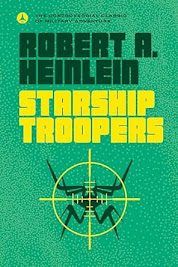Science Fiction Annotation: Starship Troopers
Title: Starship Troopers
Genre: Science Fiction
Publication Date: November 5, 1959
Number of Pages: 263 pages
Geographical Setting: varies (Earth, space, distant planets)
Time Period: several centuries into the future (no
specific dates given)
Series: N/A
Plot Summary:
Several hundred years into the future, Earth has joined into a global society, where full citizenship is only granted to those who have served a term in the Terran Federation's military. When Juan "Johnny" Rico, a recent high school graduate decides to follow his childhood friend and volunteer for service against his parents' wishes, he is exposed to the realities of military life, where fresh infantry recruits are beaten down and the weak links are discharged, opt to leave, or die in training. As the threat of a hostile alien species of Arachnids emerges, Johnny's military career advances amidst discussion of controversial philosophical, moral, and political issues within this futuristic landscape.
While set in the future, many of the ideas presented in the novel are very much of their time. Consideration of the author's views, experiences, and the political landscape of the 50's (especially those regarding nuclear weaponry, military perspectives, and war) is beneficial when reading.
Subject Headings: space warfare, military policy, dystopian governments
Appeal:
Philosophy: Starship Troopers explores philosophical and ethical ideas both explicitly through direct
conversations and reflection on lessons from Johnny’s high school History and
Moral Philosophy class, and less directly through descriptions of Johnny’s personal
experiences during his military service and the world at large. Heinlein leans
heavily into the exploration of ideas about war, rights, and government,
controversial at the time of publication and still today.
Characterization / Framing: The novel offers illustrative descriptions of science, technological
advancements, government structures, and setting from a perspective (Johnny’s)
that is detailed but limited. Johnny does not understand many scientific explanations for the technology he works with, but he emphasizes the
functionality, detailing what these futuristic armors and ships can do. For those looking for detailed descriptions without lectures on the specific sciences behind them, this perspective may be refreshing.
Pacing: This aspect of the novel can be viewed as an appeal factor or a nuisance, depending on the reader’s tastes. As the story centers around the philosophical and psychological elements (especially those surrounding the military), the pacing is leisurely at times, with a significant portion of the book taking place during Johnny’s military training at Camp Arthur Currie, where the many facets of military life are explained in detail. While the novel does have significant action, those interested in a slower pace focusing on the day-to-day will enjoy the more leisurely sections.
3 terms that best describe this book: militaristic, controversial, inventive
Relevant Fiction Works:
The Forever War by Joe Haldeman is another military science fiction novel, with common elements including futuristic technology, intergalactic battles with aliens, and powered military armor. While influenced by Heinlein's Starship Troopers, this novel offers a different perspective of the military and war's effects on humanity.
Another military science fiction novel, Ender's Game by Orson Scott Card features Earth's war with an insectoid alien species, similar to the arachnids in Starship Troopers. Both novels center around war and politics, while following the experiences of young military recruits.
John Steakley's Armor shares similarities with Starship Troopers in its military focus, coming-of-age story from the perspective of a soldier, insectoid aliens, and more.
Relevant Films:








Great job on your annotation! Your appeals are especially fantastic and I love that you included film "readalikes."
ReplyDelete